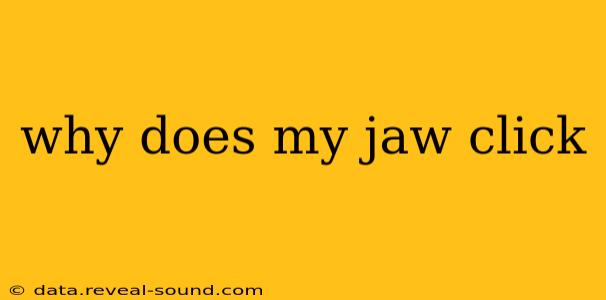Experiencing a clicking jaw can be unsettling, but it's a surprisingly common issue. This clicking sound, often accompanied by pain or discomfort, usually originates from the temporomandibular joint (TMJ), the hinge connecting your jaw to your skull. Understanding the causes behind this clicking is crucial to finding effective relief. This comprehensive guide will explore the reasons why your jaw might click, potential treatments, and when to seek professional help.
What Causes a Clicking Jaw?
The most common cause of a clicking jaw is a temporomandibular joint disorder (TMJ disorder or TMD). TMJ disorders are a group of conditions affecting the muscles and joints that control jaw movement. Several factors can contribute to these disorders:
-
Dislocation of the articular disc: The articular disc is a cartilage cushion between the jawbone and skull. If this disc becomes misaligned or displaced, it can cause a clicking or popping sound as the jaw moves. This is often the primary culprit behind clicking jaws.
-
Joint inflammation: Arthritis, particularly osteoarthritis, can inflame the TMJ, leading to clicking, pain, and stiffness.
-
Muscle spasms: Overuse or strain of the jaw muscles (masseter, temporalis) can result in spasms, which may cause clicking and pain. This is common in individuals who grind their teeth (bruxism) or clench their jaw frequently.
-
Injury: A direct blow to the jaw or a jaw injury can disrupt the joint's normal function and cause clicking.
-
Stress and anxiety: Psychological stress can exacerbate TMJ disorders, leading to increased muscle tension and jaw clenching.
What Are the Symptoms of TMJ Disorders?
While a clicking jaw is a prominent symptom, TMD can manifest in other ways. It's important to be aware of these associated symptoms:
- Pain in the jaw, face, neck, or shoulders: Pain can be localized to the joint itself or radiate to surrounding areas.
- Limited jaw movement: Difficulty opening or closing your mouth fully.
- Headaches: TMJ disorders can trigger headaches, especially tension headaches.
- Earache: Pain in the ear is a less common but possible symptom.
- Tinnitus (ringing in the ears): Some individuals report tinnitus associated with TMJ disorders.
- Facial pain: Pain that spreads to the cheeks, temples, or forehead.
How Is a Clicking Jaw Diagnosed?
A dentist or oral surgeon specializing in TMJ disorders can diagnose the problem. The diagnosis typically involves:
- Physical examination: The doctor will assess your jaw's range of motion, palpate the joint for tenderness, and listen for clicking or popping sounds.
- Imaging tests: X-rays, MRI, or CT scans may be used to visualize the joint and identify any structural abnormalities.
What Are the Treatment Options for a Clicking Jaw?
Treatment depends on the severity of the condition and the underlying cause. Options include:
-
Conservative treatments: These are often the first line of treatment and may include:
- Over-the-counter pain relievers: Ibuprofen or naproxen can help manage pain and inflammation.
- Heat or cold packs: Applying heat or cold to the jaw can alleviate discomfort.
- Jaw exercises and stretches: Specific exercises can help improve joint mobility and reduce muscle tension.
- Stress management techniques: Relaxation exercises, meditation, or therapy can help manage stress-related jaw clenching.
- Mouthguards or splints: A custom-fitted mouthguard or splint can help protect the teeth and prevent grinding or clenching.
-
More invasive treatments: If conservative measures are ineffective, these may be considered:
- Injections: Corticosteroid injections can reduce inflammation.
- Surgery: In rare cases, surgery may be necessary to correct severe joint damage or displacement.
How Can I Prevent a Clicking Jaw?
While not all clicking jaws are preventable, taking proactive steps can reduce your risk:
- Practice good posture: Maintaining proper posture reduces strain on the jaw.
- Manage stress: Employ stress-reduction techniques to minimize jaw clenching.
- Avoid chewing gum excessively: Excessive chewing can strain the jaw muscles.
- Eat soft foods: If your jaw is painful, opt for softer foods to reduce strain on the joint.
Does a Clicking Jaw Always Indicate a Problem?
Not always. A mild, occasional click might be harmless, especially if it's not accompanied by pain or other symptoms. However, a persistent clicking sound, especially when coupled with pain or limited jaw movement, warrants a visit to a dentist or oral surgeon for proper evaluation and diagnosis. Ignoring the problem can lead to more significant issues down the line.
When Should I See a Doctor About My Clicking Jaw?
Schedule an appointment with a healthcare professional if:
- The clicking is accompanied by significant pain.
- Your jaw is locking or you have difficulty opening your mouth.
- You experience headaches, earaches, or other related symptoms.
- The clicking is persistent and worsening over time.
By understanding the causes, symptoms, and treatment options for a clicking jaw, you can take control of your oral health and seek appropriate medical attention when needed. Remember, early intervention can often prevent more serious complications.
